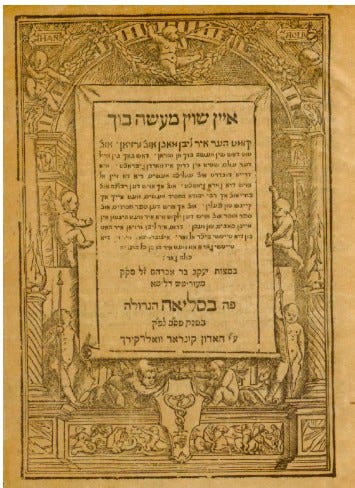In 1602, the Mayse Bukh or Book of Tales was published in Basel. A collection of 255 stories and folk tales, it was one of the most popular Yiddish books of its age, reprinted several times and with many of its tales appearing in anthologies published during the 19th and 20th centuries.
One of the most intriguing stories in the book is The Jewish Pope. Although a work of fiction, the story weaves together several historical events, including the strange story of a real life, allegedly Jewish, Pope. Various early versions of this tale were already in circulation when the Mayse Bukh’s editor and publisher, Yaakov Pollak, expanded it and included it in his compilation.
Each version of the story has different protagonists, depending on when and where it was told. The version in the Mayse Bukh begins with the kidnap of Elhanan, the son the 10th century Rabbi Shimon of Mainz. Shimon was a distinguished rabbi and poet and it is possible that his son was really kidnapped; in one of his poems Shimon includes a line praying that Elhanan will merit life in the world to come.
In the Mayse Bukh’s semi-fictitious story, one day when everyone else in Rabbi Shimon’s household was in synagogue, a Christian woman who worked for the family kidnapped Elhanan and had him baptised. This was not an uncommon event; the son of Rabbenu Gershom, a contemporary of Shimon, is known to have been kidnapped and baptised at this time. Forcible baptism of children was still going on in the 19th century; a scandal broke out in 1858 in the Italian city of Bologna when six year old Edgardo Mortara was stolen from his home. He was baptised, brought up in a Christian home and was eventually ordained as a priest.
After his baptism, Elhanan was raised in the church, ordained as a priest and became a famous scholar. He rose to the rank of cardinal and was eventually elected as Pope. Aware that he was Jewish, though the Mayse Bukh is quite vague about how he knew this, he yearned to meet his father again but did not know how to get him to come to Rome. (Neither Elhanan, nor indeed Joseph in the Bible, seem to have thought about sending his father a message telling him what had happened). In the end he came up with a ruse.



